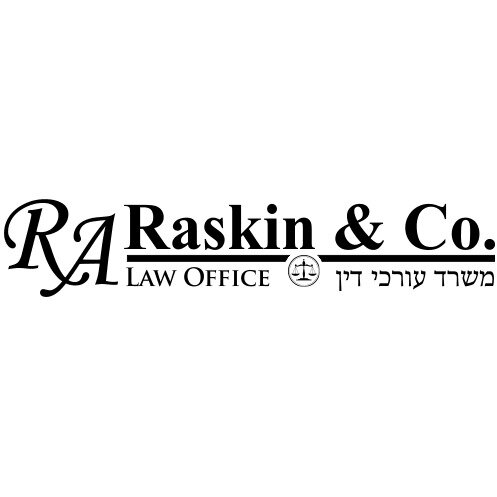Best Faith-Based Law Lawyers in Haifa
Share your needs with us, get contacted by law firms.
Free. Takes 2 min.
List of the best lawyers in Haifa, Israel
About Faith-Based Law in Haifa, Israel
Faith-Based Law in Haifa, Israel, encompasses legal matters that are adjudicated according to religious laws of different faith communities. These laws often pertain to family law, including marriage, divorce, maintenance, and inheritance, and they vary between religious groups such as Jews, Muslims, Christians, and Druze. In Israel, religious courts have jurisdiction over matters of personal status, meaning that religious laws play a critical role in these areas. Haifa, as a culturally diverse city, has institutions that cater to the legal needs of its varied religious populations, offering a unique interplay of religious and secular legal principles.
Why You May Need a Lawyer
Individuals may seek legal advice in Faith-Based Law for several reasons. Common situations include marriage and divorce proceedings, whereby individuals need representation or guidance in religious courts. Questions of child custody and guardianship often arise alongside divorce. Furthermore, inheritance disputes are another area where individuals might require legal help to ensure that assets are distributed according to religious laws. People seeking conversions or handling mixed-faith marriages may also need legal advice to navigate the complex interplay of different religious laws and the secular state laws.
Local Laws Overview
The legal landscape in Haifa, similar to the rest of Israel, respects the jurisdiction of religious courts while maintaining a framework of state laws. Key aspects include the operation of rabbinical courts for Jews, Sharia courts for Muslims, and ecclesiastical courts for Christians. These courts handle matters of personal status based on the religious membership of individuals. Civil laws, such as the Basic Law: Human Dignity and Liberty, provide overarching rights and protections, but religious laws largely govern personal status matters. Legal practitioners in Faith-Based Law must often navigate the intersection of these complex legal systems to effectively represent their clients.
Frequently Asked Questions
What is the role of religious courts in marriage and divorce?
Religious courts have exclusive jurisdiction over marriage and divorce for their respective faith communities. The laws and procedures can differ significantly between these courts.
Can faith-based legal decisions be appealed?
Yes, decisions from religious courts can often be appealed, but the process and grounds for appeal may vary. Legal counsel can provide guidance on whether an appeal is possible.
How does inheritance work in faith-based law?
Inheritance is generally governed by religious law, which dictates how assets are distributed upon death. It's essential to consult a lawyer to understand how these laws apply to specific circumstances.
Are prenuptial agreements recognized in religious courts?
Recognition depends on the specific religious court. Some may honor these agreements if they conform to religious laws. Legal advice should be sought in drafting enforceable agreements.
What happens if a legal issue crosses different religious laws?
Cases involving individuals from different religious backgrounds can be complex. Lawyers skilled in navigating multiple legal systems can help manage such situations effectively.
How does custody work in divorces handled by religious courts?
Custody often follows religious guidelines, alongside considerations for the child's welfare. Competent legal advice is essential for navigating custody arrangements.
Can I change my religious affiliation in legal documents?
Changing religious affiliation is possible but may require a formal process, including legal declarations and potential conversion procedures.
Is it possible to have a civil marriage in Haifa?
Israel does not provide civil marriage for its citizens, but civil marriages conducted abroad are recognized. Legal options should be explored with a lawyer.
How are mixed-faith disputes resolved?
Mixed-faith disputes can be intricate, often requiring mediation or settlement under both religious and civil law provisions. Expert legal guidance is crucial.
What is the role of a lawyer in faith-based legal matters?
A lawyer can help navigate the complexities of religious laws, represent your interests in religious and civil courts, and provide advice to ensure fair treatment under the law.
Additional Resources
Those seeking additional information can consult resources such as the Israeli Ministry of Justice, the Chief Rabbinate of Israel, Sharia Courts Administration, and Christian ecclesiastical bodies. Local legal aid organizations and community centers often provide counsel or referrals for faith-based legal matters.
Next Steps
If you require legal assistance in Faith-Based Law, it is advisable to contact a lawyer who specializes in this field. Begin by identifying lawyers with expertise in the relevant religious law and seek consultations to discuss your situation. Ensure your lawyer is proficient in both the religious and civil aspects of Israeli law to provide the most comprehensive advice. Prepare necessary documents and information in advance to facilitate the legal process.
Lawzana helps you find the best lawyers and law firms in Haifa through a curated and pre-screened list of qualified legal professionals. Our platform offers rankings and detailed profiles of attorneys and law firms, allowing you to compare based on practice areas, including Faith-Based Law, experience, and client feedback.
Each profile includes a description of the firm's areas of practice, client reviews, team members and partners, year of establishment, spoken languages, office locations, contact information, social media presence, and any published articles or resources. Most firms on our platform speak English and are experienced in both local and international legal matters.
Get a quote from top-rated law firms in Haifa, Israel — quickly, securely, and without unnecessary hassle.
Disclaimer:
The information provided on this page is for general informational purposes only and does not constitute legal advice. While we strive to ensure the accuracy and relevance of the content, legal information may change over time, and interpretations of the law can vary. You should always consult with a qualified legal professional for advice specific to your situation.
We disclaim all liability for actions taken or not taken based on the content of this page. If you believe any information is incorrect or outdated, please contact us, and we will review and update it where appropriate.










